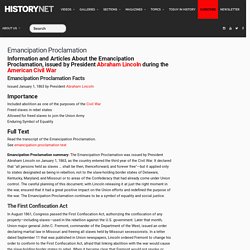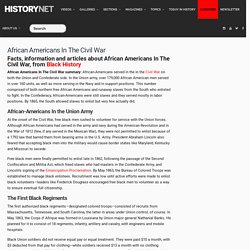

Enslavement, The Making of African American Identity: Vol. I, 1500-1865, Primary Resources in U.S. History and Literature, Toolbox Library, National Humanities Center. The awkward questions about slavery from tourists in US South. A History of Slavery in the United States. SLAVERY BROCHURE. Emancipation Proclamation. In one regard, January 1, 1863, was no different than all the other New Year’s Days in recent Washington memory—Civil War notwithstanding.

Ushers threw open the doors of the White House around 11 a.m., and ordinary citizens surged inside to mingle with dignitaries. Towering above the throng was Abraham Lincoln, patiently greeting visitors by the hundreds, “his blessed pump handle working steadily,” marveled journalist Noah Brooks. But this was to be no ordinary New Year’s Day in the nation’s capital. Today history would be made. Around 2 p.m. the president quietly slipped out of the East Room and walked upstairs to his office (now the Lincoln Bedroom) on the second floor. Solemnly, Lincoln sat down at his accustomed spot at the head of the table. Exactly 100 days earlier, Lincoln had issued a preliminary proclamation, vowing to free the slaves in all states still in active rebellion against the federal authority on this day, January 1. Hesitation was the last thing on his mind. Slavery in America - Black History.
Throughout the 17th and 18th centuries people were kidnapped from the continent of Africa, forced into slavery in the American colonies and exploited to work as indentured servants and labor in the production of crops such as tobacco and cotton.

By the mid-19th century, America’s westward expansion and the abolition movement provoked a great debate over slavery that would tear the nation apart in the bloody Civil War. Though the Union victory freed the nation’s four million enslaved people, the legacy of slavery continued to influence American history, from the Reconstruction, to the civil rights movement that emerged a century after emancipation and beyond. When Did Slavery Start?
Hundreds of thousands of Africans, both free and enslaved, aided the establishment and survival of colonies in the Americas and the New World. READ MORE: The Last Slave Ship Survivor Gave an Interview in the 1930s. But after the Revolutionary War, the new U.S. Cotton Gin. The Meaning of July 4th for the Negro Video - Frederick Douglass. Africans in America (1831-1865) - Narrative. Africans in America (1831-1865) Resource Bank. African Americans In The Civil War. By Paul D.

Escott “What shall we do with the Negro?” Was a question posed in Northern newspapers as early as the summer of 1861. The question, of course, revealed an underlying attitude— white people still regarded African Americans as objects, not equals, and not a part of the polity. The status of freed slaves clearly presented a problem for the North. The first serious proposal to overturn the Confederacy’s system of racial slavery came from a surprising source: Maj. Maj. Others Southerners had earlier voiced concern about the future of former slaves. But no one developed as thorough an argument for arming and freeing the slaves as Cleburne. “Three great causes,” he wrote, were “operating to destroy us.” Jefferson Davis had recently proposed several steps to increase the size of the Army, but Cleburne said these were simply inadequate, listing the reasons why. More eyebrow-raising assertions followed.
Throughout most of 1864, Cleburne’s proposal went nowhere. Paul D.